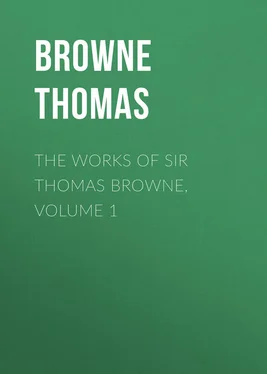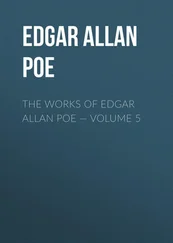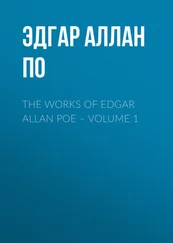Thomas Browne - The Works of Sir Thomas Browne, Volume 1
Здесь есть возможность читать онлайн «Thomas Browne - The Works of Sir Thomas Browne, Volume 1» — ознакомительный отрывок электронной книги совершенно бесплатно, а после прочтения отрывка купить полную версию. В некоторых случаях можно слушать аудио, скачать через торрент в формате fb2 и присутствует краткое содержание. ISBN: , Жанр: foreign_antique, foreign_prose, на английском языке. Описание произведения, (предисловие) а так же отзывы посетителей доступны на портале библиотеки ЛибКат.
- Название:The Works of Sir Thomas Browne, Volume 1
- Автор:
- Жанр:
- Год:неизвестен
- ISBN:http://www.gutenberg.org/ebooks/39960
- Рейтинг книги:5 / 5. Голосов: 1
-
Избранное:Добавить в избранное
- Отзывы:
-
Ваша оценка:
- 100
- 1
- 2
- 3
- 4
- 5
The Works of Sir Thomas Browne, Volume 1: краткое содержание, описание и аннотация
Предлагаем к чтению аннотацию, описание, краткое содержание или предисловие (зависит от того, что написал сам автор книги «The Works of Sir Thomas Browne, Volume 1»). Если вы не нашли необходимую информацию о книге — напишите в комментариях, мы постараемся отыскать её.
The Works of Sir Thomas Browne, Volume 1 — читать онлайн ознакомительный отрывок
Ниже представлен текст книги, разбитый по страницам. Система сохранения места последней прочитанной страницы, позволяет с удобством читать онлайн бесплатно книгу «The Works of Sir Thomas Browne, Volume 1», без необходимости каждый раз заново искать на чём Вы остановились. Поставьте закладку, и сможете в любой момент перейти на страницу, на которой закончили чтение.
Интервал:
Закладка:
Where it subsists alone, 'tis a Spiritual Substance, and may be an Angel. ] Epicurus was of this opinion, and St. Aug. in Euchirid. ad Laurentium .
Sect. 35. Pag. 52.
Moses decided that Question, and all is salved with the new term of Creation. ] That is it which Aristotle could not understand; he had learned that ex nihilo nihil fit , and therefore when he found those that disputed that the World had a beginning, did maintain that it was generated, and he could not understand any generation, but out of matter præ-existent in infinitum , therefore he took their opinion to be absurd, and upon that ground principally, concluded the World to be eternal: whereas, if he had understood that there may be such a thing as Creation, he had not done it, for that solves his processus in infinitum . Take from Plato , that the World had a beginning, and from Aristot. that it was not generated, and you have the (true) Christian opinion.
Sect. 36. Pag. 54.
In our study of Anatomy, there is a mass of mysterious Philosophy, and such as reduced the very Heathens to Divinity. ] So it did Galen , who considering the order, use, and disposition of the parts of the body, brake forth into these words: Compono hic profecto Canticam in creatoris nostri laudem, quod ultra res suas ornare voluit melius quam ulla arte possent . Galen, 3. de usu partium .
Sect. 37. Pag. 55.
I cannot believe the wisdom of Pythagoras did ever positively, and in a literal sense, affirm his Metempsychosis. ] In this the opinion of Grotius is contrary to the Author, who saith this opinion was begotten by occasion of the opinion of other Philosophers, who in their discourses of the life that is to be after this, brought such arguments, Quæ non magis de homine quam de bestiis procedunt . And therefore, saith he, mirandum non est, si transitum animarum de hominibus in bestias, de bestiis in homines alii commenti sunt . Lib. 2. de ver. Relig. Christ. (vide etiam Annotat. ejusd.). But yet there is a shrewd objection against the opinion of Pythagoras , if he did mean it literally, which is cast in by the Sectators of Democritus and Epicurus , which Lucretius remembers in these Verses:
Præterea si immortalis natura animaï
Constat, et in corpus nascentibus insinuatur,
Cur super anteactam ætatem meminisse nequimus?
Nec vestigia gestarum rerum ulla tenemus?
Namsi tantopere 'st animi mutata potestas,
Omnis ut actarum excideret retinentia rerum,
Non ut opinor ea ab læto jam longiter errat.
This Argument, 'tis true, is pro falso contra falsum , but yet holds ad hominem so far, that it is not likely (as the Author saith) but Pythagoras would observe an absurdity in the consequence of his Metempsychosis; and therefore did not mean it literally, but desired only to express the Soul to be immortal, which he, and the other Philosophers that were of that opinion, who had not heard of Creation, could not conceive, unless it must be taken for truth, that the soul were before the body; so saith Lactantius of them. Non putaverunt aliter fieri posse ut supersint animæ post corpora, nisi videntur fuisse ante corpora. De fals. Sap. c. 18.
Sect. 41. Pag. 59.
I do not envy the temper of Crows or Daws. ] As Theophrastus did, who dying, accused Nature for giving them, to whom it could not be of any concernment, so large a life; and to man, whom it much concern'd, so short a one. Cic. Tusc. quæst. l. 3. How long Daws live, see in Not. ad Sect. 41 .
Sect. 42. Pag. 61.
Not upon Cicero's ground, because I have liv'd them well. ] I suppose he alludes to an expression in an Epistle of Cicero , written in his Exile, to his wife and children, where he hath these words to his wife: Quod reliquum est, te sustenta mea Terentia ut potes, honestissime viximus, floruimus. Non vitium nostrum sed virtus nos afflixit, peccatum est nullum nisi quod non unà animum cum ornamentis amisimus , l. 24, Ep. 4.
And stand in need of Eson's bath before threescore. ] Eson was the Father of Jason , and, at his request, was by Medea , by the means of this Bath, restored to his youth. Ingredients that went into it, and the description of Medea's performance, Ovid gives you, l. 7. Metam.
Interea calido positum medicamen aheno
Fervet et exultat, spumisq; tumentibus albet.
Illic Æmonia radices valle resectas,
Seminaq; et flores, et succos incoquit atros
Adjicet extremo lapides Oriente petitos,
Et quas Oceani refluum mare lavit arenas:
Addidit exceptas lunæ de nocte pruinas,
Et Strigis infames ipsis cum carnibus alas,
Inq; virum soliti vultus mutare ferinos
Ambigui prosecta lupi, nec defuit illi
Squamea Cinyphei tenuis membrana Chelidri,
Vivacisq; jecur cervi; quibus insuper addit
Ora caputq; novem cornicis secula passæ.
His et mille aliis, postquam sine nomine rebus
Propositum instruxit mortali barbara munus
Arenti ramo jampridem mitis olivæ
Omnia confudit, summisq; immiscuit ima.
Ecce vetus calido versatus stipes aheno
Fit viridis primo, nec longo tempore frondes
Induit, et subito gravidis oneratur olivis.
At quacunq; cavo spumas ejecit aheno
Ignis, et in terram guttæ cecidere calentes,
Vernat humus, floresq; et mollia pabula surgunt.
Quæ simulac vidit, stricto Medea recludit
Ense senis jugulum, veteremq; extare cruorem
Passa replet succis, quos postquam combibit Æson,
Aut ore acceptas, aut vulnere, barba comœq;
Cunitie posita, nigrum rapuere colorem.
Pulsa fugit macies: abeunt pallorq; situsque:
Adjectoq; cavæ supplentur corpore rugæ;
Membraq; luxuriant. Æson miratur, et olim
Ante quater denos hunc se reminiscitur annos,
Dissimilemq; animum subiit, ætate relicta.
Sect. 44. Pag. 62.
Extol the Suicide of Cato. ] As doth Seneca in several places; but Lactantius saith, he cast away his life, to get the reputation of a Platonick Philosopher, and not for fear of Cæsar ; and 'tis very probable, he was in no great fear of death, when he slept so securely the night before his death, as the story reports of him.
Pag. 63.
Emori nolo, sed me esse mortuum, nihil curo. Were I of Cæsar's Religion. ] I doubt not, but here is a fault of the Press, and that instead of Cæsar it should be Cicero . I meet not with any such saying imputed to Cæsar , nor any thing like it, but that he preferr'd a sudden death (in which he had his option) to any other; but I meet with such a saying in Cicero quoted out of Epicharmus [ Emori nolo, sed me esse mortuum nihili æstimo. ] Where Cicero sustaineth the part of the Epicure that there is no hurt in being dead, since there remaineth nothing after it. Cic. 1. Thusc. qu. non procul ab initio .
Sect. 45. Pag. 64.
Or whence Lucan learn'd to say, Communis mundo superest rogus, etc. ] Why, Lucan was a Stoique, and 'twas an opinion among them almost generally, that the world should perish by fire; therefore without doubt from them he learned it. Cælum quoque cum omnibus quæ in cælo continentur, ita ut cœpisset desinere, fontium dulci aqua marisve nutriri, in vim ignis abiturum. Stoicis constans opinio est, quod consumpto humore mundus hic omnis ignescat. Minutius in Octav. But Minutius should have excepted Boetius , Possidonius , Diogenes Babylonius , and Zeno Sidonius , who were Stoiques , and yet did not think the world should be destroyed by fire, nor yet by any other means.
Читать дальшеИнтервал:
Закладка:
Похожие книги на «The Works of Sir Thomas Browne, Volume 1»
Представляем Вашему вниманию похожие книги на «The Works of Sir Thomas Browne, Volume 1» списком для выбора. Мы отобрали схожую по названию и смыслу литературу в надежде предоставить читателям больше вариантов отыскать новые, интересные, ещё непрочитанные произведения.
Обсуждение, отзывы о книге «The Works of Sir Thomas Browne, Volume 1» и просто собственные мнения читателей. Оставьте ваши комментарии, напишите, что Вы думаете о произведении, его смысле или главных героях. Укажите что конкретно понравилось, а что нет, и почему Вы так считаете.












